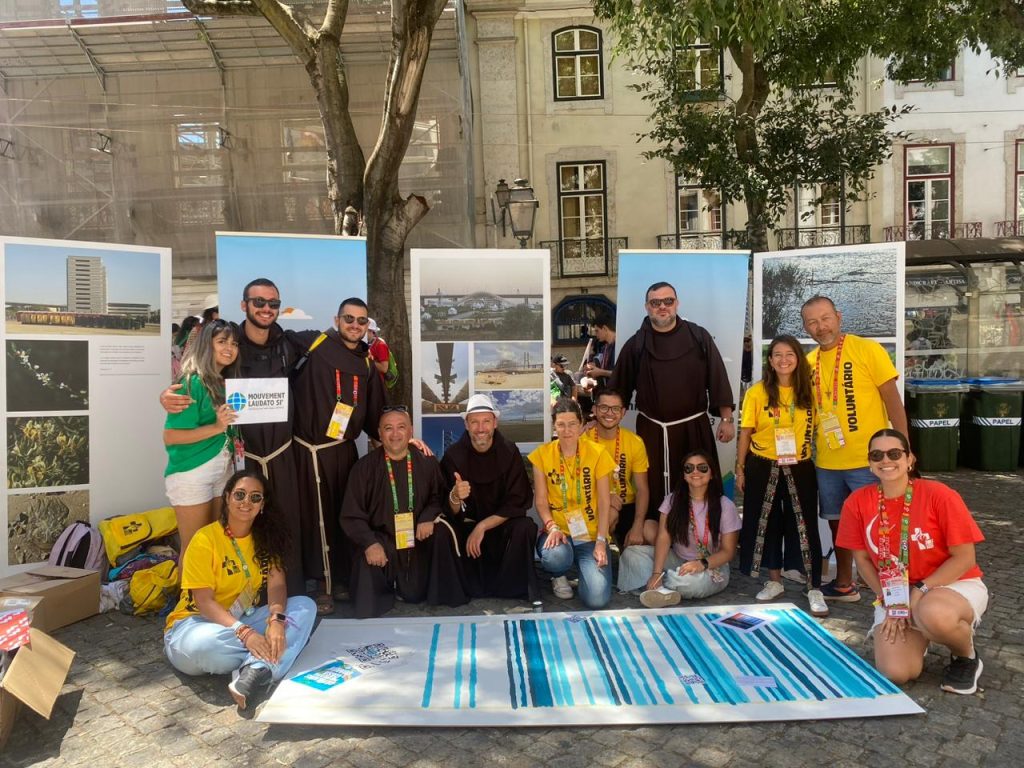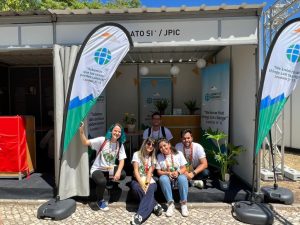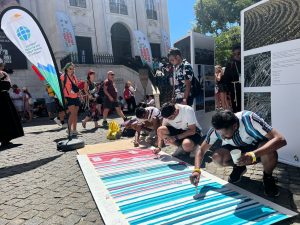
By Irene María del Pozo Gómez
Organizing an international event that involves the participation of pilgrims from different parts of the planet has an ecological footprint that we cannot ignore. However, since the start of this meeting its held emphasis on “integral ecology” and the encyclicals Laudato Si’ and Fratelli Tutti by Pope Francis, and the apostolic exhortation Christus Vivit, in which we all are called to take care of our Common Home: “Everything is connected” (LS, 91).
Sustainability is not something new at WYD. The term “integral ecology” was also present in WYD in Rio de Janeiro in 2013, drawing from the social doctrine of the church that invites us to live our lives caring for our sisters and brothers with awareness that the resources of our planet Mother Earth, are limited.
The challenge of waste
The organization‘s efforts have focused on influencing sustainability (both economic, social and environmental), inviting attendees to launch initiatives or sustainability habits during the WYD. For some people, the separation of waste was already widespread idea, assimilated and easy to apply, but, as Suzana Moreira, a member of Laudato Si’ Movement WYD Team, stated “in addition to being a challenge for those who do not have this habit, it was also a challenge for those who are already used to doing it in Portugal because the logistics of separation are different. Part of the volunteer training was precisely to become familiar with the Portuguese recycling system.”.
Water fountains instead of plastic bottles
Another initiative of the organization was to make access to water supply points available to pilgrims, both to offer free access to this common good and to avoid the consumption of single-use plastic bottles. Moreria, both a socio-environmental activist and a theologian trained at the Pontifical Catholic University of Rio de Janeiro, explains that “refilling water at the fountains is a common habit for the attending pilgrims, especially those who come from countries with less economic possibilities. Refilling the reusable bottle is done to save money and not so much for the perspective of avoiding plastics”. This leads us to reflect on the approach of environmental sustainability, but also economic sustainability and how in most cases, one is very attached to the other.
Other measures implemented include the use of public transport to access different events, encouraging people to travel on foot or to follow the recommendation to avoid the use of private motorized vehicles due to the environmental footprint and for the invasion of spaces on public roads. This encourages the host city to work toward a stronger public transport system to manage such a massive event.
The Laudato Si’ Movement has worked to make sustainability a central objective of the organization, and has acted to support the WYD Lisbon 2023 Local Organization Committee with actions such as:
- The Commitment Letter from WYD organisation
- Laudato Si online training for all volunteers (with 25,000 participants)
- The creation of the Guide “Good practices for a sustainable trip – Youth for the Care of our Common Home”
- The mobile application to calculate the Carbon Footprint (for pilgrims and volunteers), and notifications in the application about the Care of our Common Home
- Badges for the participants, with a message about Caring for our Common Home
 In addition, the day before WYD, the IV International Congress on the Care of Creation was held with speakers such as Cardinal Michael Czerny (prefect of the Dicastery for Integral Human Development of the Holy See), John Mundell (director of the Laudato Si’ Action Platform), and Fr. Eduardo Agosta (a Carmelite religious and senior advisor of the Laudato Si’ Movement). For its organization, the dedication of Antonio Garrido Salcedo of Laudato Si’ Movement was indispensable. The congress produced the Youth Manifesto on the Care of Creation, which was delivered to Pope Francis on August the 3rd during his meeting with young university students at the Catholic University of Lisbon.
In addition, the day before WYD, the IV International Congress on the Care of Creation was held with speakers such as Cardinal Michael Czerny (prefect of the Dicastery for Integral Human Development of the Holy See), John Mundell (director of the Laudato Si’ Action Platform), and Fr. Eduardo Agosta (a Carmelite religious and senior advisor of the Laudato Si’ Movement). For its organization, the dedication of Antonio Garrido Salcedo of Laudato Si’ Movement was indispensable. The congress produced the Youth Manifesto on the Care of Creation, which was delivered to Pope Francis on August the 3rd during his meeting with young university students at the Catholic University of Lisbon.
Can we offset our carbon footprint?
From the WYD Lisbon 2023 website’s sustainability section, pilgrims were invited to reflect on their carbon footprint from their daily participation, thanks to a digital application with the Carbon Footprint Calculator available to them. Initiatives have launched offset it, but this footprint cannot be offset simply by planting trees like in the Global Tree Initiative where around 18,000 trees were planted at the beginning of WYD. Although these initiatives are laudable, significant, and should continue to be promoted, no matter how many trees are planted, it will not be possible to reduce all the carbon that has been stored in the soil for millions of years in the form of fossil fuels burned to get to and from Lisbon, which all the pilgrims have used. However, there are still highly laudable initiatives that should be publicized. A group of young people from Barcelona has traveled 1,276 kilometers on foot for 40 days to meet the Pope. But not all people live 1,200 km away, nor do they have the possibility of getting around on foot. Imitating cycling pilgrims on well-established routes such as the Camino de Santiago was another good way to face those 1,200 km.
Sustainability in everyday life
During the day activities were carried out that invited pilgrims to reflection and participation. One of the activities that took place in front of the church of St. Anthony was the creation of a collective mural showing the increase in global temperature in recent decades in Lisbon, coinciding with the burning of fossil fuels due to human activity. In the image we see, among other volunteers, Igor Bastos (a graduate in Civil Engineering who worked as National Secretary of Justice, Peace and Integrity of Creation of the Franciscan Youth of Brazil), who has been part of the Laudato Si’ Movement in Lisbon. 
“Integral ecology” should be cultivated not only with the pilgrims of WYD, but also serve as a continuous task to introduce it into everyday life. The Card. Michael Czerny, at the IV International Congress on the Care of Creation, proposed nine concrete actions for the transformation of all global systems: “Achieve zero emissions by mid-century; forests and protected habitats; protect ocean shorelines from erosion by planting mangroves; cities in transformation; greener transport; regenerative agriculture; responsible economy and finances with the Earth; environmental education; and the individual role of each one in the integral ecology”.
And how can we improve sustainability in the future?
Looking ahead to the next edition of WYD in Seoul, Suzana Moreira insists that mobility is a sensitive issue, “because the means of transport with the least environmental impact are the most expensive and, therefore, the least accessible for traveling pilgrims from the Global South and who always have economic and geopolitical problems and challenges to be able to travel to WYDs”. She proposes some ideas:
“It would be interesting to create a solidarity fund to financially help pilgrims who want to opt for more sustainable transport, or also to create more awareness among pilgrims who come from countries with more economic freedom so that they are responsible and choose transportation that has less impact. In any case, everything has to be only suggestions and not demands, if we do not run the risk of excluding the diversity of people who come from different economic and social backgrounds”.
Another aspect that Suzana Moreira points out for the improvement of upcoming WYDs is insisting on the training of volunteers and pilgrims to avoid the “discard culture“. She tells us that the existence of some small independent initiatives in Lisbon can be highlighted, such as the collection and donation of objects and food. It is necessary to instill that the alternative is always to reduce consumption, not generate new waste, use durable products, or to promote reusing or using second-hand items.
The important thing is to continue working for the permanent formation of “integral ecology” of the next pilgrims.





